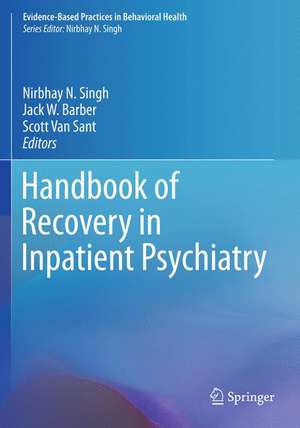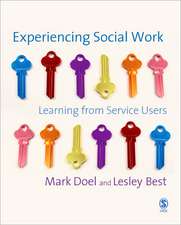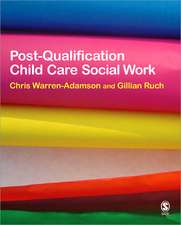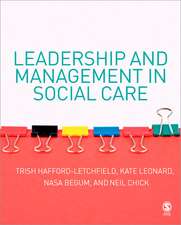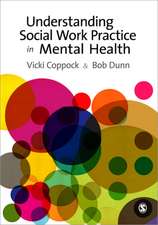Handbook of Recovery in Inpatient Psychiatry: Evidence-Based Practices in Behavioral Health
Editat de Nirbhay N. Singh, Jack W. Barber, Scott Van Santen Limba Engleză Paperback – 5 iun 2018
This handbook provides a guide for individualized, responsive, and meaningful care to patients with severe mental illness. It begins with an overview of the foundational aspects of recovery – definitions and assessment, recovery principles, recovery research, and applications of recovery principles in in inpatient psychiatry. Subsequent chapters offer in-depth analyses of provider competencies, the patient’s role in personal choices and decision making, and the deeper healing goals of recovery. The handbook also offers detailed treatment modalities, including cognitive remediation, psychological and psychiatric services, nursing and occupational therapy services, peer support, and pharmacological treatment.
Featured topics include:
- Sexuality and sexual health in the inpatient psychiatric setting.
- The power of stigma and the usage of SAMHSA (Substance Abuse and Mental Health Services Administration) principles to combat stigma.
- Legal advocacy.
- Self-advocacy and empowerment.
- Methods to enhance resilience and sustain recovery in inpatients.
- Common errors and solutions during the transformation to recovery-oriented systems.
The Handbook of Recovery in Inpatient Psychiatry is a must-have resource for researchers, graduate students, clinicians, and related professionals/practitioners in psychology, psychiatry, social work, nursing, rehabilitation therapy, occupational therapy, physical therapy, and allied professionals in related mental health and medical disciplines.
| Toate formatele și edițiile | Preț | Express |
|---|---|---|
| Paperback (1) | 607.10 lei 6-8 săpt. | |
| Springer International Publishing – 5 iun 2018 | 607.10 lei 6-8 săpt. | |
| Hardback (1) | 1940.72 lei 6-8 săpt. | |
| Springer International Publishing – 28 sep 2016 | 1940.72 lei 6-8 săpt. |
Preț: 607.10 lei
Preț vechi: 639.05 lei
-5% Nou
Puncte Express: 911
Preț estimativ în valută:
116.17€ • 121.61$ • 96.12£
116.17€ • 121.61$ • 96.12£
Carte tipărită la comandă
Livrare economică 05-19 aprilie
Preluare comenzi: 021 569.72.76
Specificații
ISBN-13: 9783319930176
ISBN-10: 3319930176
Pagini: 467
Ilustrații: XXVIII, 467 p. 6 illus.
Dimensiuni: 178 x 254 x 36 mm
Greutate: 0.85 kg
Ediția:1st ed. 2016
Editura: Springer International Publishing
Colecția Springer
Seria Evidence-Based Practices in Behavioral Health
Locul publicării:Cham, Switzerland
ISBN-10: 3319930176
Pagini: 467
Ilustrații: XXVIII, 467 p. 6 illus.
Dimensiuni: 178 x 254 x 36 mm
Greutate: 0.85 kg
Ediția:1st ed. 2016
Editura: Springer International Publishing
Colecția Springer
Seria Evidence-Based Practices in Behavioral Health
Locul publicării:Cham, Switzerland
Cuprins
PART I. Principles.- Chapter 1. The Idea of Recovery.- Chapter 2. Principles for Recovery-Oriented Care.- Chapter 3. Sexuality and Sexual Health.- Chapter 4. Teaching Clinicians the Practice of Recovery-Oriented Care.- Chapter 5. Shared Decision-Making.- PART II. Practice.- Chapter 6. Inpatient Treatment Planning.- Chapter 7. Psychopharmacological Treatment.- Chapter 8. Cognitive Remediation in Mental Health.- Chapter 9. Psychiatric Services.- Chapter 10. Psychological Services.- Chapter 11. Mental Health Nursing Services.- Chapter 12. Occupational Therapy Services.- Chapter 13. Peer Support Services.- PART III. Advocacy, Resilience, and Empowerment.- Chapter 14. Self-Advocacy and Empowerment.- Chapter 15. Legal Advocacy.- Chapter 16. Stigma and Recovery.- Chapter 17. Enhancing Resilience and Sustaining Recovery.- Chapter 18. Change and Systems Transformation.
Recenzii
“It is intended as a resource for researchers, graduate students, and clinicians and related professionals/practitioners in psychology, psychiatry, social work, nursing, rehabilitation therapy, occupational therapy, physical therapy, and others in related mental health and medical disciplines. … Of merit, this book focuses on the humanistic care of individuals and treating them with respect. It is my hope that this is how we treat our patients.” (Michael Easton, Doody's Book Reviews, February, 2017)
Notă biografică
Nirbhay N. Singh, PhD, BCBA-D, is Clinical Professor of Psychiatry and Health Behavior at the Medical College of Georgia, Augusta University, Augusta, GA and CEO of MacTavish Behavioral Health, in Raleigh, NC. Prior to his current appointments, he was a Professor of Psychiatry, Pediatrics and Psychology at the Virginia Commonwealth University School of Medicine and Director of the Commonwealth Institute for Child and Family Studies, Richmond, Virginia. His interests include mindfulness, behavioral and psychopharmacological treatments of individuals with diverse abilities, assistive technology, and mental health delivery systems. He is the Editor-in-Chief of three journals: Journal of Child and Family Studies, Mindfulness, and Advances in Neurodevelopmental Disorders, and Editor of three book series: Mindfulness in Behavioral Health, Evidence-Based Practices in Behavioral Health, and the Springer Series on Child and Family Studies.
Jack W. Barber, MD, is the Interim Commissioner and Medical Director for Virginia’s Department of Behavioral Health and Developmental Services and Associate Clinical Professor in the University of Virginia Department of Psychiatry and Neurobehavioral Sciences. He has served as a member of the Designated Consultant teams for United States Department of Justice Settlement Agreements with the states of Kentucky and Connecticut and provided consultations to the states of California and Georgia. His clinical and educational interests include the application of recovery principles in inpatient psychiatric and forensic settings, treatment planning for complex individuals, and leadership within behavioral health systems.
Scott Van Sant, MD, is a Clinical Assistant Professor at the Medical College of Georgia, Augusta University, Augusta, GA. He obtained his medical degree from the University of South Florida and completed his psychiatry residency training at Emory University in Atlanta. He is board-certified in general adult and forensic psychiatry. He has spent his entire career in the public sector behavioral health field, including formerly serving as medical director of DeKalb Crisis Center in Atlanta Georgia, chief medical officer of Central State Hospital in Milledgeville, Georgia, medical director of MCG's adult and geriatric inpatient psychiatric units, and associate training director of MCG’s general psychiatry residency training program. Presently, he is Clinical Director of Benchmark Human Services, Georgia Crisis Programs, which provides emergency mobile crisis interventions for individuals with mental health and developmental disability diagnoses across the state of Georgia. His particular interests include psychopharmacology, treatment of persons with chronic severe mental illness, management of co-occurring psychiatric and intellectual disabilities, and improvement of mental health delivery systems.
Textul de pe ultima copertă
This handbook provides a guide for individualized, responsive, and meaningful care to patients with severe mental illness. It begins with an overview of the foundational aspects of recovery – definitions and assessment, recovery principles, recovery research, and applications of recovery principles in in inpatient psychiatry. Subsequent chapters offer in-depth analyses of provider competencies, the patient’s role in personal choices and decision making, and the deeper healing goals of recovery. The handbook also offers detailed treatment modalities, including cognitive remediation, psychological and psychiatric services, nursing and occupational therapy services, peer support, and pharmacological treatment.
- Sexuality and sexual health in the inpatient psychiatric setting.
- The power of stigma and the usage of SAMHSA (Substance Abuse and Mental Health Services Administration) principles to combat stigma.
- Legal advocacy.
- Self-advocacy and empowerment.
- Methods to enhance resilience and sustain recovery in inpatients.
- Common errors and solutions during the transformation to recovery-oriented systems.
The Handbook of Recovery in Inpatient Psychiatry is a must-have resource for researchers, graduate students, clinicians, and related professionals/practitioners in psychology, psychiatry, social work, nursing, rehabilitation therapy, occupational therapy, physical therapy, and allied professionals in related mental health and medical disciplines.
Caracteristici
Details how recovery can form the backbone of clinical practice in inpatient psychiatry Explores various interventions across a broad spectrum of inpatient psychiatric care of individuals with severe mental illness Examines foundational aspects of inpatient recovery, including its definitions, principles, research, and applications Addresses issues involved in positive transformation of public mental health hospitals? Includes supplementary material: sn.pub/extras
